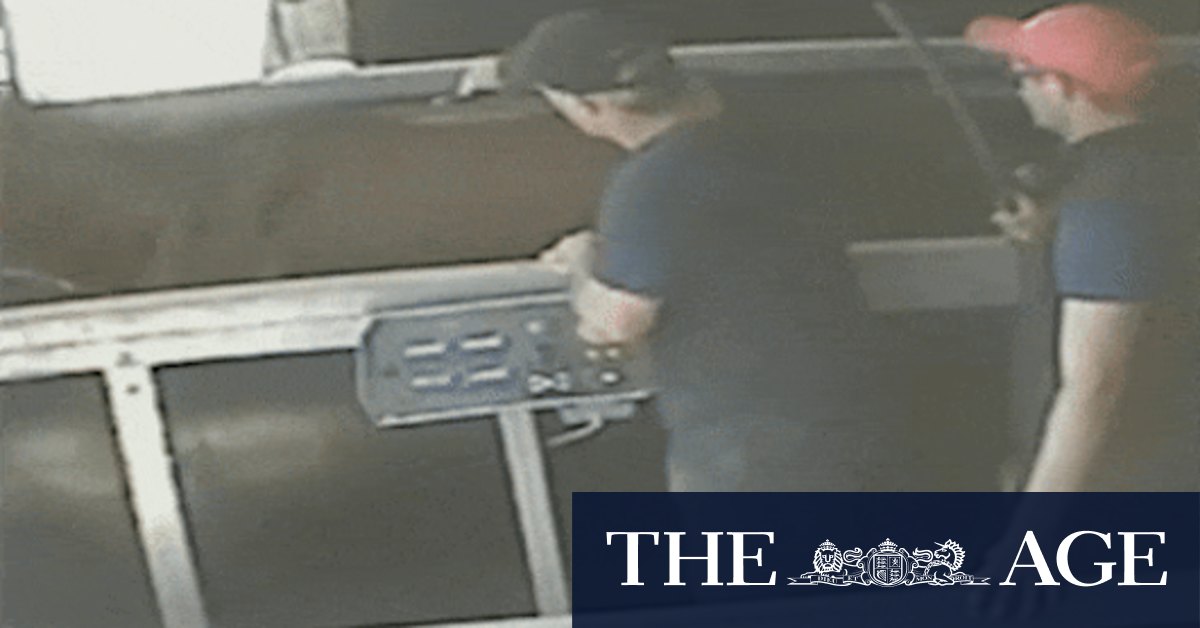When the machine gathers sufficient speed, the camera films Weir casually placing his left hand in his jeans pocket to retrieve a jigger, a small battery-powered device about the size of a cigarette packet.
He then reaches forward, places the jigger’s electrodes on the back of the galloping horse and pushes the button to deliver a shock.
He zaps three Melbourne Cup hopefuls – Red Cardinal, Yogi and Tosen Basil – a total of 25 times.
As he delivers the series of electric shocks, Weir checks the speed of the machine, while McLean occasionally taps the galloping horse on the rump with a piece of plastic poly pipe.
Kermond helps Weir fit headgear onto each animal, called blinkers, as they are led onto the treadmill. He also helps Weir remove the blinkers when they are finished.
Loading
Racing Victoria stewards alleged that the use of blinkers during a race as well as hitting the horse on the rump with a whip – replicating the poly pipe – were “contextual cues” that would make a horse run faster because it feared it was going to be shocked.
When the training session is complete, the film shows the treadmill slowing to a stop and the horses being backed out and walked calmly to their barns. They do not buck, nor squeal. The process takes a matter of minutes.
The Victorian Racing Tribunal heard that Weir used the jigger seven times on Red Cardinal and nine times each on Tosen Basil and Yogi.
Only Red Cardinal ran in that year’s Melbourne Cup, finishing second last, more than 60 lengths behind the winner, Cross Counter. Tosen Basil never raced again, while Yogi finished seventh in the Lexus Stakes and did not qualify to run in the Cup.
Loading
Racing Victoria stewards accused McLean and Kermond of acting as lookouts during the jigger operation, knowing their conduct was prohibited and the “arrangement was to keep it secret from others”.
All three men were disqualified.
Weir told stewards he had “no idea what I was doing” when filmed shocking his horses on the treadmill.
“Like, it’s something that I wish I hadn’t done for sure. I was trying to get these horses to improve,” he said.
“I knew I was breaking the rules, I knew that, and it was a terrible decision. I understand all that, 100 per cent, but I was just trying to get them to run to the best of their ability.”
Stewards asked Weir if he would have continued the shock treatment if his horses had performed well.
“The main thing was, I wasn’t happy doing it and was very uncomfortable, so that was the main reason that I stopped because I just didn’t – I wasn’t comfortable doing it, and it makes me sick when I watch the film,” Weir said. “I’m glad they didn’t run well. So the decision was very easy.”

Darren Weir leaves Melbourne Magistrates Court in October 2019.Credit: Jason South
Three months after the film was shot, police and Racing Victoria stewards raided Weir’s Ballarat stables. Four jiggers were found in his nearby house.
He was disqualified for four years in January 2019, while McLean and Kermond were suspended for three years and two months in October 2019.
Police initially denied the existence of the video, but it was shown as evidence in the Warrnambool Magistrates Court in December 2022.
Weir was found guilty of animal cruelty by the court and fined $36,000 but avoided a criminal conviction.
Police then handed the 15-minute clip to Racing Victoria stewards who would view the contents, interview Weir and lay new industry charges.
Weir was disqualified for a further two years by the Victorian Racing Tribunal in September 2024. McLean was disqualified for nine months, while Kermond was disqualified for three months.
Victorian Racing Tribunal chairman Judge John Bowman said Weir would now be remembered for his association with “instruments of cruelty”.
News, results and expert analysis from the weekend of sport sent every Monday. Sign up for our Sport newsletter.

